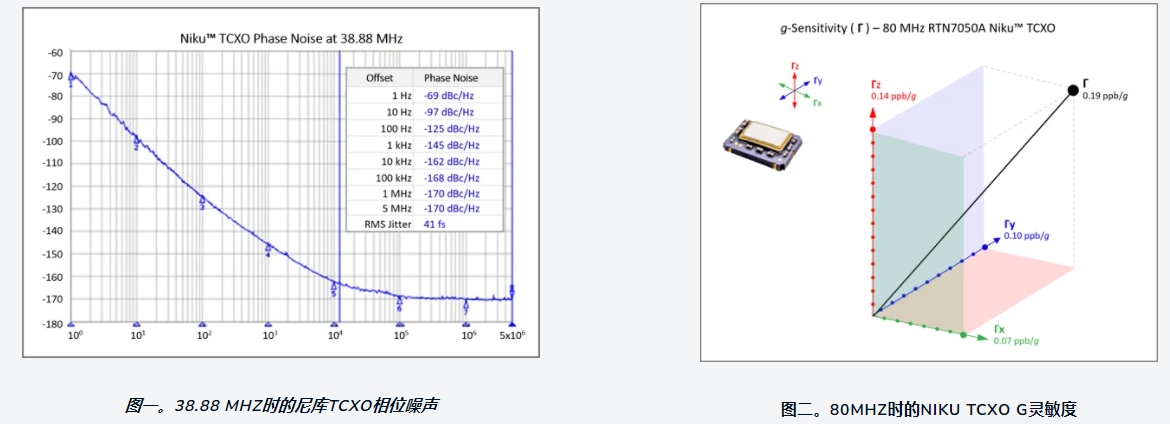瑞康TCXO晶振的理想方案为AI计算
瑞康TCXO晶振的理想方案为AI计算,Rakon今天发布了Niku,这是一款新的内部设计的ASIC半导体芯片,用于超稳定TCXOs(温度补偿晶体振荡器)。
Niku是Rakon非常成功的冥王星的继任者®TCXO山脉1。新平台的首批产品提供了人工智能计算的基本属性,结合了小于50飞秒的一流超低抖动、100ppb的频率稳定性和高达100MHz的高频。
Rakon首席执行官Sinan Altug博士表示,Niku的推出为该公司的人工智能计算产品组合奠定了基础,该产品组合提供了使数据中心能够满足人工智能工作负载所产生的额外要求所需的性能。
“Rakon行业领先的技术和产品非常适合于克服数据中心面临的实时并行和分布式计算的同步挑战,并帮助我们的客户释放人工智能工作负载所需的主要性能增益,包括高带宽可用性和超低延迟,”Altug博士说。
除了人工智能计算/数据中心,Niku产品还将满足其他苛刻应用的要求,如5G、5G Advanced和6G接入网络、精确定位、汽车/V2X、工业5.0和卫星终端。特别是定位客户将受益于SMD振荡器出色的稳定性和低g灵敏度特性(0.2 ppb/g).

Rakon超稳定TCXOs产品经理陈本表示,Niku TCXO平台是Rakon致力于技术卓越和创新的证明。
“Niku产品路线图承诺SMD尺寸范围从7 x 5 mm和5 x 3 mm到3 x 2 mm,并在频率稳定性、进一步扩展的温度选项和g灵敏度方面不断进步,”Chen先生说。
所有基于Niku的振荡器都采用了Rakon改变游戏规则的晶体MEMS振荡器技术XMEMS®,在尽可能小的封装中提供领先的振荡器性能。XMEMS谐振器采用专有的晶圆级光刻工艺设计和制造,与传统晶体谐振器相比,具有更好的g灵敏度、迟滞和频率斜率。
除了XMEMS晶体和Niku ASIC,新的Niku产品还具有Rakon专有的Kelvin2温度传感器,使振荡器的温度补偿更加精确。瑞康TCXO晶振的理想方案为AI计算.
Rakon首款采用Niku技术的产品是RTN7050A、RTN5032A和RTN5032D超稳定TCXOs,主要规格如下:
RTN7050A:SMD封装:7.0 x 5.0 x 1.5 mm |超低抖动:< 50 fs |低本底噪声:-170 dBc/Hz @ 38.88 MHz |高频:最高100 MHz |频率稳定性:100 ppb(40至85°C)|扩展工作温度:-40至105°C |低g灵敏度:0.2 ppb/g|长期稳定性:4.6 ppm/20年
RTN5032A:SMD封装:5.0 x 3.2 x 1.75 mm |超低抖动:< 50 fs |低本底噪声:-170 dBc/Hz @ 38.88 MHz |高频:最高100 MHz |频率稳定性:100 ppb(40至85°C)|扩展工作温度:-40至105°C |低g灵敏度:0.2 ppb/g|长期稳定性:4.6 ppm/20年
RTN5032D:低高度密封SMD晶振封装:5.0 x 3.2 x 1.2 mm |超低抖动:< 50 fs |低本底噪声:-170 dBc/Hz @ 38.88 MHz |频率:10 - 50 MHz |频率稳定性:100 ppb(40至85°C)|扩展工作温度:-55至105°C |低g灵敏度:0.2 ppb/g|长期稳定性:4.6 ppm/20年
Niku的推出是Rakon 2014财年的一个重要里程碑,是公司三年发展战略的一部分。Rakon人工智能计算产品组合的下一个产品版本MercuryX计划在2023年底前推出,目前正在与选定的客户进行测试。
Product Name
Image
Package Size (LxWxH)
Nominal Frequency (Fn)
Frequency Stability (FvT)
Temperature Range (°C)
Long Term Stability
Phase Noise (P/N)
RST2016A

2.0 x 1.6 x 0.7 mm
13 to 52 MHz
±0.5 to 1.5 ppm
-40 to 85 °C
±1 ppm/year
Typ. P/N @26 MHz
-93 dBc/Hz @10 Hz
-117 dBc/Hz @1 kHz
-151 dBc/Hz @100 kHz
RST2016N

2.0 x 1.6 x 0.7 mm
10 to 52 MHz
±0.5 to 1.5 ppm
-40 to 85 °C
±1 ppm/year
Typ. P/N @26 MHz
-90 dBc/Hz @10 Hz
-138 dBc/Hz @1 kHz
-157 dBc/Hz @100 kHz
RST2520A

2.5 x 2.0 x 0.8 mm
13 to 52 MHz
±0.5 to 1.5 ppm
-40 to 85 °C
±1 ppm/year
Typ. P/N @26 MHz
-93 dBc/Hz @10 Hz
-117 dBc/Hz @1 kHz
-151 dBc/Hz @100 kHz
RST2520N

2.5 x 2.0 x 0.8 mm
10 to 52 MHz
±0.5 to 1.5 ppm
-40 to 85 °C
±1 ppm/year
Typ. P/N @26 MHz
-90 dBc/Hz @10 Hz
-138 dBc/Hz @1 kHz
-157 dBc/Hz @100 kHz
RST3225A


3.2 x 2.5 x 0.9 mm
13 to 52 MHz
±0.5 to 1.5 ppm
-40 to 85 °C
±1 ppm/year
Typ. P/N @26 MHz
-93 dBc/Hz @10 Hz
-117 dBc/Hz @1 kHz
-151 dBc/Hz @100 kHz
RST3225N
3.2 x 2.5 x 0.9 mm
10 to 52 MHz
±0.5 to 1.5 ppm
-40 to 85 °C
±1 ppm/year
Typ. P/N @26 MHz
-90 dBc/Hz @10 Hz
-138 dBc/Hz @1 kHz
-157 dBc/Hz @100 kHz
RST2016H

-40 to 105 °C
13 to 52 MHz
±0.5 to 1.5 ppm
-40 to 105 °C
±1 ppm/year
Typ. P/N @26 MHz
-92 dBc/Hz @10 Hz
-136 dBc/Hz @1 kHz
-153 dBc/Hz @100 kHz
RST2016HC

-40 to 105 °C
13 to 52 MHz
±2 to 3 ppm
-40 to 105 °C
±1 ppm/year
Typ. P/N @38.4 MHz
-91 dBc/Hz @10 Hz
-139 dBc/Hz @1 kHz
-155 dBc/Hz @10 kHz
RST2520HC

2.5 x 2.0 x 0.8 mm
10 to 52 MHz
±2 to 3 ppm
-40 to 105 °C
±1 ppm/year
Typ. P/N @38.4 MHz
-91 dBc/Hz @10 Hz
-139 dBc/Hz @1 kHz
-155 dBc/Hz @10 kHz
RST3225HC

3.2 x 2.5 x 0.9 mm
10 to 52 MHz
±2 to 3 ppm
-40 to 105 °C
±1 ppm/year
Typ. P/N @38.4 MHz
-91 dBc/Hz @10 Hz
-139 dBc/Hz @1 kHz
-155 dBc/Hz @10 kHz
RST3225H

3.2 x 2.5 x 0.9 mm
10 to 52 MHz
±0.5 to 1.5 ppm
-40 to 105 °C
±1 ppm/year
Typ. P/N @26 MHz
-92 dBc/Hz @10 Hz
-136 dBc/Hz @1 kHz
-153 dBc/Hz @100 kHz
RST2520H

2.5 x 2.0 x 0.8 mm
10 to 52 MHz
±0.5 to 1.5 ppm
-40 to 105 °C
±1 ppm/year
Typ. P/N @26 MHz
-92 dBc/Hz @10 Hz
-136 dBc/Hz @1 kHz
-153 dBc/Hz @100 kHz
New platform’s first products offer best-in-class ultra-low jitter of less than 50 femtoseconds @80 MHz.
Rakon today launched Niku™, a new in-house designed ASIC semiconductor chip for Ultra Stable TCXOs (Temperature Compensated Crystal Oscillators).
Niku is the successor to Rakon’s highly successful Pluto® TCXO range1. The new platform’s first products provide the essential attributes for AI computing, combining best-in-class ultra-low jitter of less than 50 femtoseconds with ±100 ppb frequency stability and high frequencies of up to 100 MHz.
Rakon Chief Executive, Dr Sinan Altug, says the launch of Niku lays the foundations for the company’s AI computing product portfolio, which delivers the performance needed to enable datacentres to meet the additional requirements created by AI workloads.
“Rakon’s industry-leading technology and products are ideally suited for overcoming the synchronisation challenges that datacentres face with real-time parallel and distributed computing, and help our customers unlock the major performance gains demanded by AI workloads, including high bandwidth availability and ultra-low latency,” says Dr Altug.
In addition to AI computing/ data centres, Niku products will also satisfy the requirements for other demanding applications such as 5G, 5G Advanced and 6G access networks, precision positioning, automotive/V2X, Industry 5.0 and satellite terminals. Positioning customers in particular will benefit from the oscillators’ excellent stability and low-g sensitivity behaviour (0.2 ppb/g).
Ben Chen, Rakon’s Product Manager for Ultra Stable TCXOs says the Niku TCXO platform is a testament to Rakon’s commitment to technological excellence and innovation.
“The Niku product roadmap promises an SMD footprint range from 7 x 5 mm and 5 x 3 mm to 3 x 2 mm with continuing advances in frequency stability, further extended temperature options and g-sensitivity,” says Mr Chen.
All Niku-based oscillators feature Rakon’s game-changing crystal MEMS technology, XMEMS®, which delivers leading oscillator performance in the smallest possible package. XMEMS resonators are designed and manufactured using a proprietary wafer-level photolithographic process and offer significantly better g-sensitivity, hysteresis and frequency slope compared to traditional crystal resonators.
In addition to the XMEMS crystal and Niku ASIC, the new Niku products also feature Rakon’s proprietary Kelvin™ 2 temperature sensor, resulting in more accurate temperature compensation in the oscillator.
Rakon’s first products featuring Niku are the RTN7050A, RTN5032A and RTN5032D Ultra Stable TCXOs, with the following key specifications:
RTN7050A: SMD package: 7.0 x 5.0 x 1.5 mm | Ultra low jitter: <50 fs | Low floor noise: -170 dBc/Hz @ 38.88 MHz | High frequency: up to 100 MHz | Frequency stability: ±100 ppb over -40 to 85°C | Extended operating temperature: -40 to 105°C | Low g-sensitivity: 0.2 ppb/g | Long-term stability: ±4.6 ppm/20 yr
RTN5032A: SMD package: 5.0 x 3.2 x 1.75 mm | Ultra low jitter: <50 fs | Low floor noise: -170 dBc/Hz @ 38.88 MHz | High frequency: up to 100 MHz | Frequency stability: ±100 ppb over -40 to 85°C | Extended operating temperature: -40 to 105°C | Low g-sensitivity: 0.2 ppb/g | Long-term stability: ±4.6 ppm/20 yr
RTN5032D: Low height hermetically sealed SMD package: 5.0 x 3.2 x 1.2 mm | Ultra low jitter: <50 fs | Low floor noise: -170 dBc/Hz @ 38.88 MHz | Frequency: 10 - 50 MHz | Frequency stability: ±100 ppb over -40 to 85°C | Extended operating temperature: -55 to 105°C | Low g-sensitivity: 0.2 ppb/g | Long-term stability: ±4.6 ppm/20 yr
The launch of Niku is an important FY24 milestone for Rakon, set out in the company’s three-year growth strategy. The next product release in Rakon’s AI computing portfolio, MercuryX™, is scheduled for launch before the end of 2023 and is currently with selected customers for testing.
“推荐阅读”
相关技术支持
- KVG石英振荡器T-53S3A2070JXH-LF-26.000MHz数据手册
- Transko石英晶体CS32H-F5050CQ12-65.000M-TR应用说明
- Golledge石英晶振GXO-3306G在医疗器械设计中的作用
- ConnorWinfield晶振FTS125系列GPS定时和同步解决方案
- SiTime振荡器SiT1533AI-H4-D14-32.768S老化及其在精密计时中的重要性
- Statek晶体HGXO3DSTSM320.0M,30/50/I振荡器的操作指南
- 欧洲石英25HDK2261-A-156.250M差分振荡器输出逻辑
- MtronPTI高频XO9095-002R低相位噪声和低g灵敏度OCXO
- Cardinal抖动在高性能设计中的重要性CPPC7L-A5BR-40.0TS
- Silicon Labs超小型BG22系列蓝牙解决方案
 手机版
手机版



 添加微信
添加微信


